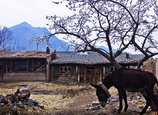
BEIJING, June 3 (Xinhua) -- The State Forestry Administration on Monday reported on the success of an artificially-bred panda's life in the wild over the past eight months.
A group of experts have been following the panda named Tao Tao with the help of a GPS ring attached to the animal's neck, radio positioning tools and DNA extracted from its excrement. They have also been studying the panda's activities and hormones, the SFA said.
Tao Tao, a three-year-old male panda born in Sichuan's Wolong Nature Reserve in 2010, is living a healthy life in the Liziping Nature Reserve in Shimian County, Sichuan Province, the SFA said.
In addition to surviving a cold winter, the panda has also experienced the seasonal activities of his wild peers, including estrus cycles and interactions between groups of pandas, according to the administration.
Experts have been suggesting that more pandas be released into the Liziping Nature Reserve to improve methods for preparing artificially-bred pandas to survive in the wild.
Released into the wild in October 2012, he was the second artificially-bred panda to be released, following five-year-old Xiang Xiang's release in 2006. However, Xiang Xiang died in fights with other wild pandas for food and territory roughly a year after being introduced to the wild.
Scientists and experts later drew lessons from the experience and improved their training methods. In June 2010, the nation adopted small-scale training programs for pandas before returning them to nature. The new training program focuses on encouraging a panda cub to learn from its mother.
Unlike Xiang Xiang's captive-bred environment, Tao Tao grew up in semi-wild conditions from a young age. Therefore, his fighting capabilities and survival skills were both significantly better than that of Xiang Xiang, said Zhang Hemin, director of the China Conservation and Research Center for the Giant Panda. 
Latest Development of the Fire
















 Photo story: Mask girl's hard life
Photo story: Mask girl's hard life


![]()
